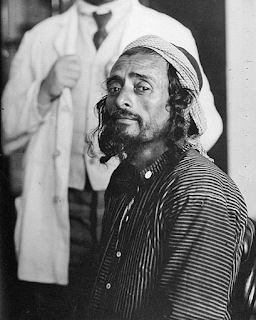
Mystery surrounds Shalom Shabazi, Yemenite Jewry’s most famous rabbi and poet. An orphan born into poverty in the 17th century, Shabazi has been elevated into a symbol and saint. A new film tries to do justice to different interpretations of his life and character. David Guedj writes in Haaretz :
Young Yemenite, early 20th century (photo: Ephraim Moshe Lillen)
Despite his financial plight, Shabazi acquired a very broad religious education, one that encompassed the entire universe of Jewish tradition. He achieved extraordinary fluency in the three languages that are the pillars of Jewish wisdom – Hebrew, Aramaic and Judeo-Arabic – as well as classical Arabic. Hence the intercultural mosaic that underlies his writings.
A poetic spirit impelled Sharazi from youth. Even though he was immersed in the study of Judaism in all its facets, poetry was the core of his spiritual activity, and the medium in which he was most prolifically creative. His 850 poems (written in both Hebrew and in Arabic translated to Hebrew) will be published next year in an academic edition, under the aegis of Professor (Yosef) Tobi.
The manifold narratives of Shabazi’s life are reflected in the remarks of the film’s interviewees. Shaer Meoded has chosen not to set forth one single story; there are as many versions as there are speakers. Judaic studies scholar Bat-Zion Eraqi Klorman, for example, relates that Shabazi had three children, whereas poet Tuvia Sulami refers to four. The latter adds that Shabazi’s father died of natural causes, but Lea Avraham, a singer and former member of the Inbal dance troupe, describes the father was tortured to death in the presence of his young son. The diversity of biographical information stems from the fact that there are almost no surviving contemporaneous, written testimonies about Shabazi. The meager information we have derives from popular traditions handed down from one generation to the next and from biographical tidbits interspersed in his poetry.
The multiplicity of voices expressed by the interviewees is reflected in a particularly meaningful way thanks to the various interpretations the director offers for the poems. Thus, for example, “Ayelet Chen” (Graceful Gazelle) can be read as a work about love between a man and a woman, according to the bold exegesis of Lea Avraham, literary scholar Galili Shahar, and writer and poet Almog Behar. Alternately, it can be seen as a poem of longing for the Shekhinah – the “divine presence,” according to Jewish mystical tradition – and for the Holy Land, according to the conservative interpretation of Yehuda Amir, an expert in Yemenite poetry, and Uri Melamed, a scholar of modern Hebrew. The film itself shows no preference for either possibility. On the contrary: It creates tension and interest precisely through the debate among speakers characterized by different religious beliefs, age, gender and academic expertise.

Leave a Reply